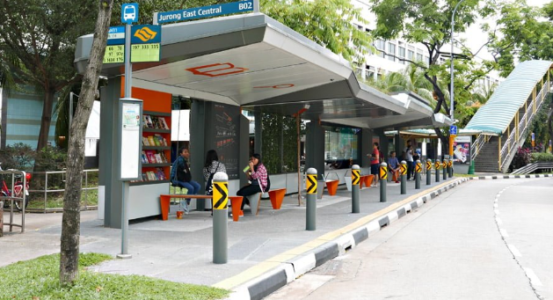Starting December 26, fares for adult card users will increase by 4 cents for journeys up to 8.2km and 5 cents for longer trips.
SINGAPORE: Bus and train fares in Singapore will see an increase of up to 5 cents beginning December 26, as announced by the Public Transport Council (PTC) on Wednesday (October 12) following its annual fare review.
For adult card holders, fares will rise by 4 cents for journeys covering distances of up to 8.2km, while those exceeding 8.2km will incur a 5-cent hike. For instance, an MRT ride from Boon Lay to Clementi, which spans 8.2km, will now cost S$1.45, up from S$1.41. Similarly, a trip from HarbourFront to Paya Lebar, measuring 11.5km, will increase to S$1.64 from the previous S$1.59.
According to the PTC, approximately 54% of adult journeys fall under the 8.2km distance category. The increase in fares for concession card holders will be limited to 1 cent per journey, aimed at keeping costs manageable for students, senior citizens, lower-wage workers, and individuals with disabilities.
Monthly concession passes and adult monthly travel passes will not see any changes in price, and bus cash fares will remain the same for the third consecutive year since 2019.
To assist lower- and lower-middle-income households—those with a monthly income of up to S$1,600—the Government will distribute 600,000 public transport vouchers worth S$30 each. These can be used to top up fare cards or purchase monthly concession passes.
Addressing Rising Energy and Labour Costs The fare adjustment is necessitated by soaring energy prices, which have surged by 117% over the past year, as per the PTC. Combined with rising manpower costs and inflation, this has led to a maximum allowable fare adjustment of 13.5% according to the PTC’s fare adjustment formula. This figure represents the highest adjustment since the formula’s implementation in 2005.
However, the PTC has decided to grant public transport operators only a 2.9% fare increase due to concerns over the rising cost of living. The remaining 10.6% will be deferred to future fare review exercises.
Currently, public transport accounts for about 1.8% of the average household income, based on the public transport affordability indicator from the Department of Statistics. With the impending fare hike, the PTC anticipates that the monthly expenditure on public transport will remain stable, factoring in average wage increases.
At a press conference, PTC chairperson Janet Ang emphasized the council’s consideration of both the economic landscape and the fare formula’s percentage increase. “We will digest it together as a community,” she stated.
Transport Minister S Iswaran echoed this sentiment in a Facebook post following the announcement, asserting that “fare adjustments are never easy.” He noted that maintaining a financially sustainable public transport system necessitates fare updates to cover increased operational costs, while the Government will implement measures such as public transport vouchers, concession schemes, and subsidies to help ensure affordability, especially for vulnerable groups.
As of last month, public transport ridership has rebounded to approximately 80% of pre-pandemic levels. Last year, fares for buses and trains rose by up to 4 cents after the PTC approved a maximum allowable fare adjustment of 2.2% to assist operators amid rising operating costs and reduced ridership during the COVID-19 pandemic. This marked the first fare increase since 2019, when adult fares rose by 9 cents per journey.
During the 2020 fare review, the PTC opted not to raise fares due to the economic challenges posed by the COVID-19 crisis.
Reviewing Fare Adjustment Mechanisms In August, the PTC announced it is reviewing the methodology used for fare adjustments. This review, expected to conclude in the first half of next year, will assess the effectiveness of the current formula and mechanism for adjusting fares, taking into account changes in the public transport sector and commuting habits.
The PTC also aims to propose strategies to maintain a balance between affordable public transport fares and the financial sustainability of the public transport system.








